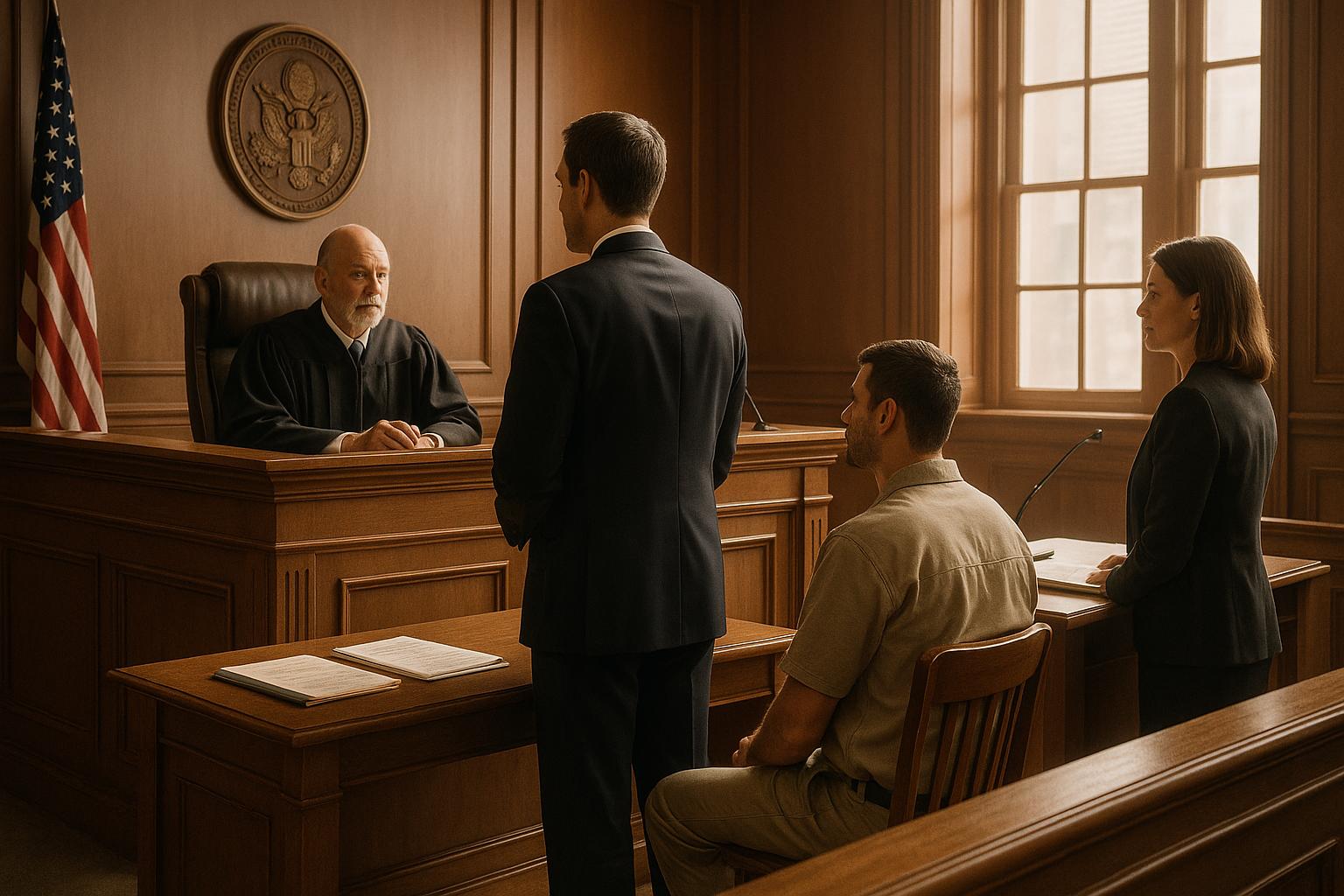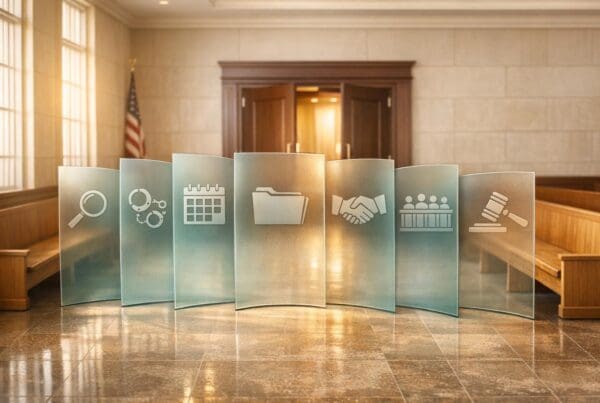When someone is arrested, a bond hearing is the first step in determining if they can be released before trial. In South Carolina, this hearing typically occurs within 24 hours of an arrest and focuses solely on release conditions – not guilt or innocence. Judges weigh factors like the severity of charges, criminal history, and community ties to decide on bond amounts or conditions. Here’s a quick breakdown:
- Timing: Held within 24 hours; usually 8-12 hours after arrest.
- Judge’s Role: Sets bond based on public safety, flight risk, and case specifics.
- Bond Types: Personal recognizance (no upfront payment), surety bonds (via bondsman), or cash bonds (full payment to court).
- Outcomes: Release, bond denial, or additional restrictions like curfews or no-contact orders.
Legal representation is crucial to securing favorable conditions. Attorneys can advocate for lower bonds, personal recognizance, or reduced restrictions. Without a lawyer, defendants risk higher bonds or stricter terms.
What is a Bond Hearing and Why Does it Matter?
Definition and Purpose of Bond Hearings
A bond hearing is a legal process where a judge decides if a defendant can be released from custody while waiting for their trial to begin. The main goal is to ensure the defendant shows up for future court dates and doesn’t pose a danger to the community. Importantly, a bond hearing isn’t about determining guilt or innocence – it’s strictly about deciding whether pretrial release is appropriate.
The Eighth Amendment protects against "excessive bail", requiring bond amounts to be fair and based on the charges and the defendant’s individual situation. Having a skilled attorney by your side can make a big difference in negotiating for a lower bond and less restrictive release conditions.
When Bond Hearings Occur in South Carolina
South Carolina law ensures that bond hearings happen quickly. For bailable offenses, a hearing must take place within 24 hours, and release often happens within four hours after bond is posted. In practice, hearings are usually held within eight to twelve hours following an arrest.
There are, however, key exceptions. Magistrates cannot set bonds for charges that carry a potential life sentence (except for first-degree burglary) or for capital offenses. In these cases, only a circuit court judge can handle the bond, which can take weeks or even months. For these serious charges, an attorney must file a motion and request a hearing before the General Sessions Court.
These timelines highlight just how important bond hearings are in protecting the rights of defendants as their cases move forward.
Who Participates in a Bond Hearing
A bond hearing involves several key individuals, each playing a specific role that influences the court’s decision about pretrial release. Understanding these roles can help you prepare for the hearing and anticipate how it might unfold.
The Judge’s Role
The judge is the central figure in any bond hearing, ultimately deciding the outcome. At the hearing, the judge informs you of the charges against you and explains your legal rights. They listen to arguments from both your defense attorney and the prosecutor, carefully weighing the evidence and testimony presented. The judge’s decision balances your constitutional right to reasonable bail, the need to protect public safety, and ensuring your return for future court dates.
Several factors influence the judge’s decision, including the severity of the charges, your criminal history, ties to the community, risk of fleeing, and potential threat to public safety. For more serious offenses, the judge may set a higher bond or even deny bail altogether.
The Defense Attorney’s Role
Your defense attorney is your advocate, working to secure your release or negotiate the most favorable conditions possible. They present evidence to show that you are neither a flight risk nor a danger to the community. This could include pointing to stable employment, family responsibilities, or strong community connections as reasons you are likely to appear for future court dates.
In some cases, your attorney may argue for release on personal recognizance, which allows you to be released without posting bail based solely on your promise to return for future proceedings. If the bond amount set by the court seems excessive, they can file a motion to request a reduction or argue for fewer restrictions if new evidence supports your case. Having legal representation early in the process is crucial for thorough preparation and better outcomes.
The Prosecutor and Other Participants
The prosecutor represents the state and focuses on public safety and ensuring you appear for future court dates. During the hearing, they may argue for stricter conditions, higher bail, or even denial of release altogether. Prosecutors often present evidence emphasizing the seriousness of the charges, any perceived threat you might pose to the community, and the risk of you fleeing before trial.
Other individuals may also play a role in the hearing. A bailiff ensures order in the courtroom, and a court reporter documents the proceedings. Victims or law enforcement officers might provide statements, while family members or community supporters can attend to show that you have strong local ties and a reliable support system.
Each of these participants contributes to the outcome of your bond hearing. Their arguments, evidence, and presence all factor into the court’s decision.
How Judges Decide Bond Amounts
When judges set bond amounts, they weigh several factors to strike a balance between a defendant’s right to reasonable bail and concerns about public safety or the likelihood of the defendant showing up for court. These factors guide their decisions during bond hearings. One key consideration is the nature of the crime itself.
Type and Seriousness of the Crime
The severity and type of charges heavily influence bond amounts. For example, violent felonies often result in higher bonds or even a denial of bail altogether. Judges assess whether the crime involved violence or the use of weapons. For less severe offenses, like minor misdemeanors or traffic infractions, bond amounts are typically lower, and in some cases, defendants may be released on personal recognizance. On the other hand, charges involving domestic violence, assault, drug trafficking, or weapons offenses are scrutinized more closely. If the crime is violent or the defendant has a history of repeated offenses, the likelihood of bond being denied increases significantly.
Defendant’s Background and Community Connections
A defendant’s personal background and ties to the community also play a big role in bond decisions. Judges look for signs of stability, such as steady employment, strong family relationships, and long-term residency. These factors suggest the defendant is less likely to flee. Financial resources are also considered – while having assets can indicate stability, they can also raise concerns about the ability to leave the jurisdiction. Providing evidence like employment records, proof of residency, and details about family connections can help argue for a lower bond amount.
Criminal History and Public Safety Concerns
A defendant’s criminal history is another critical factor. A clean record can work in your favor, while prior convictions or instances of skipping court can result in higher bond amounts or even denial of bail. Even minor violations of past bond conditions can signal a risk of non-compliance with new requirements. If the bond amount seems excessive, your attorney may file a motion to reduce it. Ultimately, the judge aims to balance the presumption of innocence and the right to pretrial release with the need to protect the public and ensure the defendant appears for future court dates.
sbb-itb-ce0cbb0
What Can Happen at a Bond Hearing
At a bond hearing, the judge reviews various factors to decide whether you’ll be released or remain in custody. Understanding the possible outcomes can help you prepare for what lies ahead. Typically, the judge’s decision falls into one of three main categories.
Release on Personal Recognizance
In South Carolina, personal recognizance (PR) bonds are often the default option under the law. With a PR bond, you’re released without paying money upfront, based solely on your promise to attend future court appearances. According to South Carolina Code § 17-15-10, PR bonds are required for noncapital offenses unless the judge believes your release would threaten public safety or make you unlikely to appear in court.
However, it’s important to note that there’s no constitutional right to a PR bond in South Carolina. Article I, § 15 of the South Carolina Constitution does set some limits on bonds, but the ultimate decision depends on whether the judge believes you’ll return to court and whether your release poses any risks to others.
Surety Bond and Cash Bond Options
If the judge determines that a monetary bond is necessary, you’ll have a few payment options. A cash bond requires you to pay the full bond amount upfront. The good news? If you meet all court requirements, you’ll get this money back at the end of your case.
Surety bonds work a bit differently. In this case, you hire a bondsman and pay them a non-refundable fee, usually around 10% of the total bond amount, to secure your release. For instance, on a $5,000 bond, you’d pay the bondsman roughly $500.
There’s also the option of a 10% bond in some situations. With this type of bond, you pay 10% of the bond amount directly to the court instead of to a bondsman. This can be a more affordable choice since you might recover some of the money, unlike the fee paid to a bondsman.
Bond Denial and Additional Requirements
In some cases, the judge may decide against granting bond altogether. This typically happens if the judge believes you’re a flight risk or a danger to the community. Under the law, bond can only be denied if you’re charged with a violent crime, a capital offense, or an offense punishable by life in prison. If bond is denied, you’ll remain in custody until your case is resolved.
Even when bond is granted, the judge might impose extra conditions. These could include supervised release, travel restrictions, curfews, or no-contact orders.
If your bond is denied or set at an amount you can’t afford, it’s not the end of the road. You can request a reconsideration of the bond conditions. Circuit courts can also review bonds for general sessions offenses initially set by summary court judges. Your attorney can file for a bond reduction or ask for a reconsideration hearing if needed. These steps are an important part of navigating the legal process and working toward a resolution.
How to Prepare for a Bond Hearing
Getting ready for a bond hearing can be the deciding factor between being released and staying in custody. Knowing what the court expects to see can improve your chances of a favorable outcome.
Getting Legal Representation
The first step is to contact an attorney as soon as possible. In South Carolina, you only have 24 hours before appearing in front of a judge, so acting quickly is crucial. A skilled criminal defense attorney can argue for your release by highlighting your ties to the community, your employment status, and your character. They’ll also guide you through the legal process and protect your rights. A well-prepared attorney can show the court that you’re neither a flight risk nor a danger to others.
Preparing for the Hearing
Once you’ve secured legal representation, the next step is to build a strong case for your release. Your attorney may call on witnesses to support your case, but there are also steps you can take to strengthen your position:
- Gather Documentation: Collect documents like employment records, lease agreements, and utility bills that show your connection to the community. Courts often consider factors like family ties, job stability, financial resources, character, how long you’ve lived in the area, and your history of showing up for court.
- Prepare Character References: Ask employers, family members, or community leaders to provide statements about your reliability and commitment to appearing in court.
- Dress Appropriately: Wear conservative business attire to show respect for the court.
- Be Transparent: Share your full criminal history and financial situation with your attorney so they can build the best defense.
The goal is to present clear evidence of your stability and ties to the community.
Following Bond Conditions
If you’re released, staying compliant with your bond conditions is essential to avoid any risk of revocation. Common bond conditions in South Carolina include curfews, travel restrictions, no-contact orders, electronic monitoring, and drug or alcohol testing. You’ll typically need to sign a form acknowledging your understanding of these rules and the penalties for violating them, as outlined by the Attorney General’s office.
In some cases, you may be released to a surety – a person or organization responsible for ensuring you meet the court’s requirements. The surety is tasked with supervising your compliance, making sure you attend all scheduled hearings, and notifying the court if you violate any conditions or fail to appear.
It’s a good idea to keep records that show you’re following all bond conditions. For example, you might save appointment cards for probation check-ins or document adherence to a curfew. These records can demonstrate your commitment to the court’s requirements. Additionally, your attorney can work to negotiate reasonable bond conditions during the hearing, ensuring that the terms are manageable while still meeting legal obligations.
Key Points About Bond Hearings
Bond hearings play a pivotal role in the criminal justice process, where preparation and legal representation can significantly influence the outcome.
Having an attorney during a bond hearing can make a measurable difference. Defendants with legal representation are 20% more likely to be released on their own recognizance, avoiding monetary bail entirely. On the other hand, unrepresented individuals face bail amounts that are, on average, $600 higher than those with attorneys. Claire Mauksch, Assistant General Counsel at The Bail Project, emphasizes this point:
"Representation during a bail hearing is not only a constitutional right: it has a significant effect on the outcome of the judge’s bail determination – and could be the difference for someone between spending months behind bars, versus fighting a case from the comfort and safety of their home and community."
Timely legal intervention can be the difference between a dismissal and a conviction. Attorneys not only advocate for their clients but also navigate complex legal procedures, develop defense strategies, and protect constitutional rights.
The broader picture reveals systemic gaps. Over half of U.S. counties do not provide counsel at bail hearings. This highlights the importance of securing representation and being thoroughly prepared for the hearing.
Judges consider various factors, including a defendant’s community ties, employment status, criminal history, and the severity of the charges. Skilled attorneys can present these details effectively, often suggesting alternatives like electronic monitoring or treatment programs to influence the court’s decision.
Lastly, following bond conditions is critical. Violating these terms can lead to immediate revocation of bail and a return to custody, making it essential to fully understand and comply with all requirements.
FAQs
What can I do if I can’t pay the bond set at my hearing?
If you can’t afford the bond amount set at your hearing in South Carolina, there are a few paths you can take. One option is filing a Motion to Reconsider Bond with the court. This involves presenting proof of your financial situation and explaining why the current bond is too high, in hopes of having it reduced.
Another route is working with a bail bondsman. In this case, you’d pay a non-refundable fee – usually about 10% of the total bond amount – and the bondsman would post the bond on your behalf. This can ease the financial burden upfront, though the fee won’t be returned.
If neither of these options works, you might have to stay in custody until your court date. Consulting an attorney is crucial to fully understand your rights and figure out the best approach for your circumstances.
How can I show strong community ties to help my bond hearing outcome?
Having strong connections to your community can play a crucial role in securing a favorable bond decision. These connections demonstrate to the court that you are firmly rooted in the area and unlikely to leave. Examples of such ties include close family relationships, steady employment, long-term residency, and active participation in local organizations or activities.
To make your case stronger, gather and present supporting evidence. This could include documents like proof of employment, letters of support from family members or community leaders, records of homeownership or long-term leases, and documentation of volunteer work or community involvement. Sharing these details during your hearing helps show the judge that you are committed to remaining in the community and fulfilling your legal responsibilities.
What happens if I break the conditions of my bond after being released?
If you break the terms of your bond, the judge has the authority to revoke your bail and send you back into custody. On top of that, you could face bond forfeiture, which means losing any money or property you used to secure your release.
Repeated or serious violations can bring even more trouble, like new charges or stricter conditions. In some instances, this might increase the chances of being held in jail until your trial. To avoid these consequences, it’s crucial to follow all the conditions of your bond closely.





